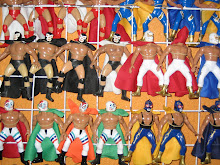 In Leo Rosten´s lexicographic classic The Joys of Yiddish, the reader can find ample synonyms for the word chutzpa: “gall, brazen nerve, effrontery, incredible ‘guts’,” all of which come from the ancestral Hebrew word for audacity (92-93). I find myself encountering a special type of chutzpa on a frequent basis in Venezuela, and it exists in the form of blunt honesty blended with an affinity to joke about people playfully and constantly. In Spanish, Venezuelans refer to this ubiquitous practice as echar broma, often involving a healthy dose of double entendre. I take you to the local bakery near my apartment in Cumaná to illustrate this.
In Leo Rosten´s lexicographic classic The Joys of Yiddish, the reader can find ample synonyms for the word chutzpa: “gall, brazen nerve, effrontery, incredible ‘guts’,” all of which come from the ancestral Hebrew word for audacity (92-93). I find myself encountering a special type of chutzpa on a frequent basis in Venezuela, and it exists in the form of blunt honesty blended with an affinity to joke about people playfully and constantly. In Spanish, Venezuelans refer to this ubiquitous practice as echar broma, often involving a healthy dose of double entendre. I take you to the local bakery near my apartment in Cumaná to illustrate this.One day late in the afternoon, I walked into the local bakery. The clerks at the display case were busy as usual while they served the steady flow of customers. “Here comes Harry Potter” I heard one clerk whisper to the other as I approached; nearly everyone in the Bolivarian Republic of Venezuela has told me that I look like Harry Potter. Fighting my way towards the front, as is the standard, I gave my usual “hola, buenas tardes” to the young female clerk who was about to take my order. The clerks had already begun to make fun of me regularly, having been a customer for about a month and a half. This usually had involved exaggerated impersonations of my thick foreign accent. Yet today the practice of echar broma strayed from the limited realm of pronunciation, and the young woman took a different approach.
“Do you like to drink tomato juice,” the clerk asked me.

I responded sheepishly, “No, I do not like tomato juice.” I was a little surprised too.
“You don’t like tomato juice!?”
“No I don’t. Why do you ask?”
“Are you telling me that you never drink tomato juice!?!” she continued.
“He doesn’t like tomato juice,” chimed in a nearby clerk.
I began to feel more nervous, and everyone in line seemed to notice the banter taking place. My body temperature began to rise; someone had turned up the thermostat in eastern Venezuela. “Why do you want to know whether or not I like to drink tomato juice?” I asked vexingly.
“Because you look like a tomato!” she cried out, referring to my rosy complexion aggravated by the tropical climate and embarrassment. The other clerks and a few customers let out a series giggles as I stood at the front of the line speechless.

This chutzpa characterizes the art of echar broma, and I learn everyday that it is something to be embraced and reciprocated.
For this reason, Venezuelans fearlessly make their jokes in a back and forth fashion, pushing the stakes higher and higher. I would call many of their jokes border line harsh by the standards of the United States. In a similar fashion, most nicknames clearly point out a person’s physical imperfections. However, these jokes always end in reassuring and reciprocating grins no matter the degree of audacity employed in the joke.
 So, the next day I figured that the clerks working the counter would have no problem with a photo shoot for my blog. I showed up at the bakery around closing time when customer traffic was minimal and explained to the clerks my reasons for taking a few pictures. They did not understand the concept of a blog during my spiel, yet they quickly revealed excitement after I asked permission to take some pictures. Suffice it to say, the photo shoot was successful.
So, the next day I figured that the clerks working the counter would have no problem with a photo shoot for my blog. I showed up at the bakery around closing time when customer traffic was minimal and explained to the clerks my reasons for taking a few pictures. They did not understand the concept of a blog during my spiel, yet they quickly revealed excitement after I asked permission to take some pictures. Suffice it to say, the photo shoot was successful.Sometimes the Venezuelan style of echar broma can come off too boldly, especially since we tend to take jokes on physical appearance quite personally in the United States. Yet as I become more accustomed to these tendencies of Venezuelan culture, I realize that it is a two-way street requiring a proper exchange of quips. Accordingly, I try my best to joke back and with success; my grin seems to be wider and wider each time I leave the bakery.

Work Cited
Rosten, Leo. The Joys of Yiddish. New York: Pocket Books, 1973.



